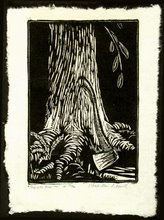 "As Gregor Samsa awoke one morning from uneasy dreams he found himself transformed in his bed into a monstrous vermin."
"As Gregor Samsa awoke one morning from uneasy dreams he found himself transformed in his bed into a monstrous vermin."This is the opening line to The Metamorphosis, the highly acclaimed novella by Franz Kafka, first published in 1915. The story is about Gregor, a traveling salesman whose life changes when he awakens in the body of a cockroach. The story is also about Gregor's family--his dependent parents and sister, who now must earn a living, as well as care for their grotesquely debilitated family member. In the end, Gregor's family agrees they are better off without this bug.
The beauty of The Metamorphosis lay in its ability to inspire so many different formulations of its meaning. And that's what good literature does, right? It forces you to dig deep, ponder life beyond the inked images of the page.
Let's see. I just read an article in the New York Times that exposes Kafka for being a "fraud", because "'the story is actually non-fiction,' according to a statement by Kafka's editor." "Kafka simply wrote a completely verifiable, journalistic account of a neighbor by the name of Gregor Samsa who, because of some bizarre medical condition, turned into a ‘monstrous vermin.’"
Supposedly there is a rare disease known as entomological dysplasia, in which the sufferer, over time, develops a hard carapace, a segmented body and antennas.
The article's author, Mark Leyner, reports: "In a telephone interview, Mr. Kafka was contrite and tearful. 'I know what I did was wrong,' he said. 'I’m very alienated from myself, but that’s no excuse to lie. I took someone’s life and selfishly turned it into an enigmatic literary parable.'”
Hold the presses. Didn't this guy die in 1924?
Mr. Leyner's article goes on to say, "Mr. Kafka’s publishers are now reviewing all his works of fiction — stories about singing mice, 'hunger artists' and men on trial for crimes they’re not aware of having committed — to determine whether they too are true." “'We were duped,'” said E., Mr. Kafka’s editor. “'The whole story is pure, unadulterated non-fiction. This guy’s a complete con man.'”
Is he? I can understand criticizing an author, like Margaret B. Jones, for passing off a fictitious work as factual. But condemning a novelist for turning fact into fiction? Isn't art suppose to imitate life?
I double-checked to make sure today is not April 1st. The article sounded like a joke to me. What are your thoughts?









7 comments:
http://www.xyhd.tv/2008/03/rants-and-tangents/entomological-dysplasia-when-humans-transform-in-to-insects/
Yes, it's a joke. Leyner is riffing on the recent spate of cases in which memoirists have been found to have made up their stories.
The fact that he refers to Kafka as still living is I guess his tip-off that the article is fictional. I found it interesting that the bio at the end of the op-ed it simply said that Leyner is a novelist and screenwriter, or something like that.
Many people would refer to him as a "comic novelist" or "humorous novelist": his novels are usually offbeat humor with titles such as "My Cousin, My Gastroenterologist" and "Et tu, Babe?"
Leyner is also co-author of the (mostly) nonfiction books, "Why Do Men Have Nipples?" and "Why Do Men Fall Asleep After Sex?"
Um, I don't get why they're making such a big deal. Don't we take real life situations and turn them into fiction all the time? Isn't that what novelists do?
Deborah P.
"Um, I don't get why they're making such a big deal. Don't we take real life situations and turn them into fiction all the time? Isn't that what novelists do?'
Novels are clearly identified as such--by being put in the Fiction section of a bookstore or library, or by even putting the words "A Novel" on the book cover.
The article being discussed was on the op-ed page, which is often used for factual discussions of issues. Leyner's piece certainly gave some hints that it was humorous, but nothing in the piece said it was humor or fictitious. Even the bio of Leyner didn't mention that he is known primarily for humorous fiction.
It is fictional. It is weird, though, in a good weird way.
Yes, Leyner or the Times should have noted somewhere that the piece was fictitious. Poor Kafka!
I'm not clear as to the point of Leyner's article. If he was trying to justify the merit of those authors who'd written memoirs that turned out to be fictitous, I think he failed. You cannot judge fiction as if it were the flip side of non-fiction. One is apples, the other oranges. If the article was only meant to be humorous, arouse attention and discussion, he succeeded!
Yes, here's a link that explains the intent of Mark Lanyer in writing this article:
http://putthatcoffeedown.blogspot.com/2008/03/entomological-dysplasia-can-i-really.html
Post a Comment